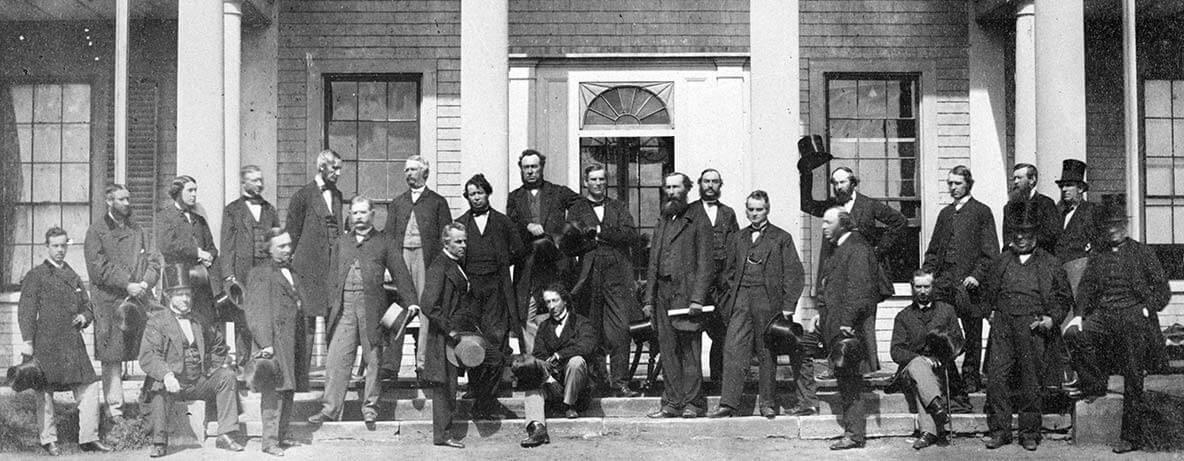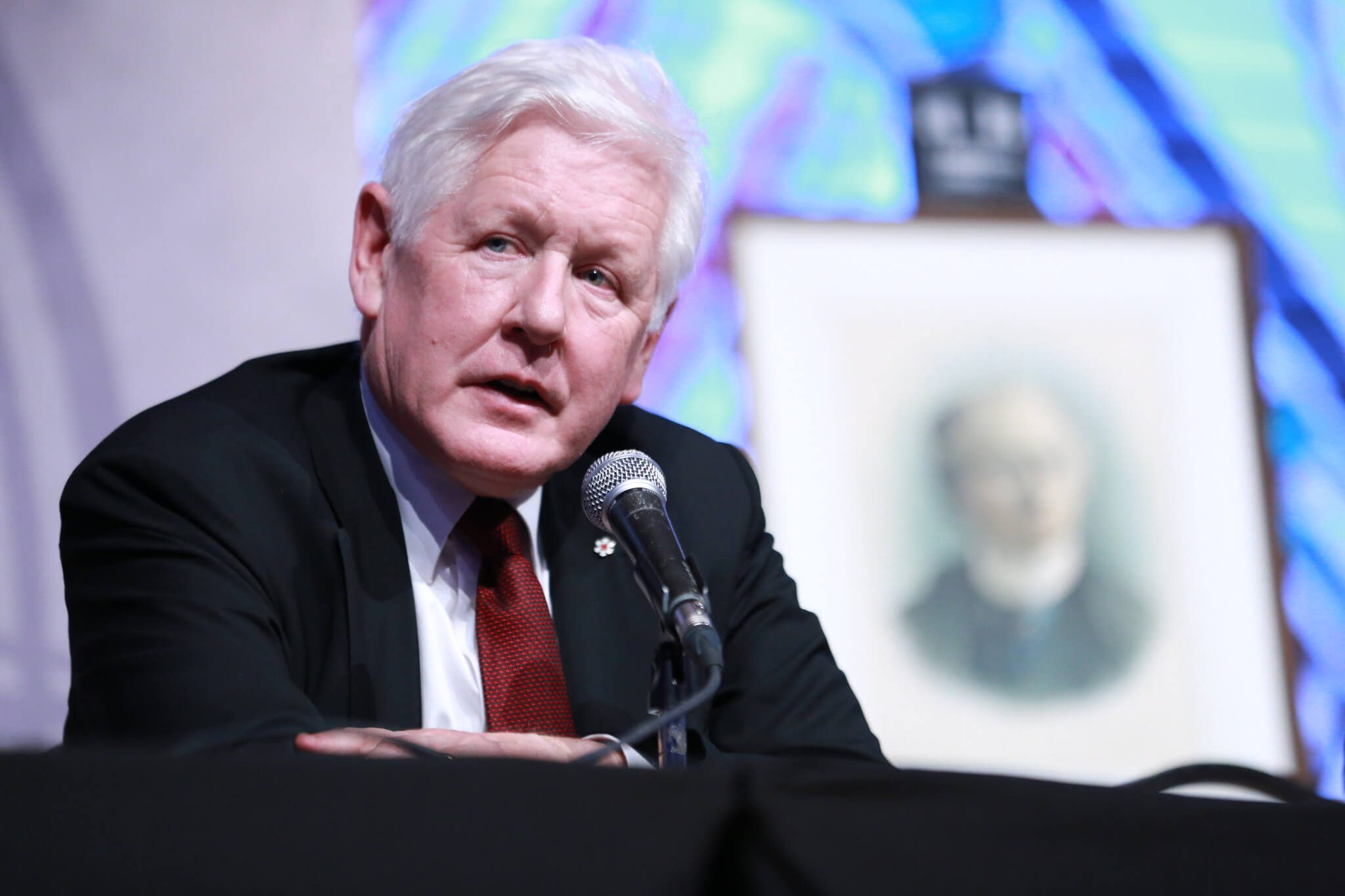Munk Senior Fellow Alastair Gillespie, who leads the MLI Confederation Project, explores how leading statesmen from 1865 articulate the political challenges they grappled with. Here he looks at Thomas D’Arcy McGee.
By Alastair C. F. Gillespie, February 7, 2015
The Hon. Thomas D’Arcy McGee, Minister of Agriculture and Statistics, today addressed the legislature in support of confederation. He concludes a week-long barrage by the five chief coalition ministers, after which they will cede the floor for replies from the opposition leaders and the general debate. Throughout, Mr. McGee demonstrated his characteristic interest in large ideas, taking for his subject the ideal of confederation.
Mr. McGee first reviewed the history of confederation, considering its development as an idea. Men as far back as Richard John Uniacke and John Beverley Robinson wrote of a union of the colonies, and lately an extensive pamphlet literature has grown up, preparing the public mind. The “private writer in his closet,” Mr. McGee declaimed, “was kindling a fire that would ultimately light up the whole political horizon, and herald the dawn of a better day for our country and our people.”
Before confederation, he argued, there was first imagination: “If we have dreamed a dream of union … it is at least worthwhile remarking that a dream which has been dreamed by such wise and good men may, for aught we know or you know, have been a sort of vision — a vision foreshadowing forthcoming natural events in a clear intelligence.” The public mind has been readied for unity, and now its time has come: “Events stronger than advocacy, events stronger than men, have come in at last like the fire behind the invisible writing to bring out the truth of these writings and to impress upon the mind of every thoughtful man who has considered the position and probable future of these scattered provinces.”
Mr. McGee argued that a mental union of the colonies has already come into being, and is already having beneficial effects. As the minister has said well on another occasion, “our mental independence is an essential condition of our political independence.” The public discussion of constitutional matters would do no discredit to more established communities. Recent events were “sound mental food,” and to every man “a topic upon which he can fitly exercise his powers, no longer gnawing at a file and wasting his abilities in the poor effort of advancing the ends of some paltry faction or party.” McGee believes “the provincial mind … [has] leaped at a single bound out of the slough of mere mercenary struggles for office.” We had “the metal, the material,” he said, “out of which to construct a new and vigorous nationality.”
McGee then shifted to the central political motives for confederation, and here he said we have had three warnings. First a friendly warning from England, in the form of responsible government, free trade, and changes to the defence. Second a warning from the Americans, engulfed in civil war: “when the three cries among our next neighbours are money, taxation, blood, it is time for us to provide for our own security.” Third was the warning from within, five successive governments in two years, surviving or falling only by the call of a page, searching after absent members.
Next McGee discussed the social advantages of union, principally the fostering of a new patriotism. To French Canadians confederation offered the junction of the former territories of New France, and reunion with the long lost French of the Maritimes: “they will naturally look to you, their petitions will come to you … sure allies to your own compact body, to aid your legitimate influence in the Federal councils.” McGee surveyed the Maritime population now to be united with Canada, arguing closer connection would naturally stir up a new patriotism without special advocacy. Finally he offered remarks as an English-speaking member from Lower Canada. “There seems to be a good deal of exaggeration on the subject of race,” said McGee. “Whose words are these — ‘God hath made of one blood all the nations that dwell on the face of the Earth?’” He had no fear of a French Canadian majority in the future local legislature; they were not an intolerant people.
McGee’s last subject was the idea of federation, a component of his New Nationality ideal. “There is something in the frequent, fond recurrence of mankind to this principle,” said McGee, “among the freest people, in their best times and worst dangers, which leads me to believe that it has a very deep hold in human nature itself.” McGee believes federation “adapted as to promote internal peace and external security, and to call into action a genuine enduring and heroic patriotism.” And why might this be? Because federation is “eminently favourable to liberty, because local affairs are left to be dealt with by local bodies and cannot be interfered with by those who have no local interest in them, while matters of a general character are left exclusively to a general government.” The New Nationality is inherently federal; as a consequence it will tend to be free. The idea recalls another of McGee’s aphorisms, on the merit of union’s deep reservoirs of moderation: “unity is to liberty as the cistern in the desert is to the seldom sent shower.”
For his summation McGee returned to his imperative, the summoning of a new national ideal. “What really keeps nations intact and apart? A principle. When I can hear our young men say as proudly, ‘our Federation’ or ‘our Country,’ or ‘our Kingdom,’ as the young men of other countries do, speaking of their own, then I shall have less apprehension for the result of whatever trial the future may have in store for us.” McGee has dreamed the dream of union, and he has dreamt it well. Canada may yet span a continent, but Canada is an empire of the mind. The watchwords of McGee’s New Nationality: unionism, patriotism, toleration and federation, and crowning these, liberty and justice for all.
Alastair C.F. Gillespie, a Canadian lawyer living in London, U.K., is a Macdonald-Laurier Institute Munk Senior Fellow and leader of the MLI Confederation Project.



